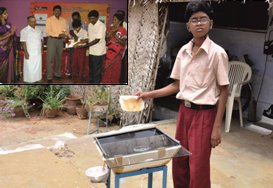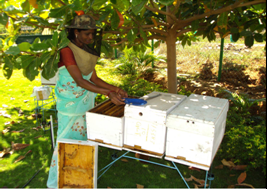BEEKEEPING
Promotion of Bee-Keeping
| Name of Entrepreneur |
: |
Mrs. Manjula Parthiban |
| Name of Village |
: |
Kolapalur |
| Block |
: |
Gobichettipalayam |
| District |
: |
Erode district (TN) |
| Contact No |
: |
09488022395, 09442171818 |
I am Manjula, age 35 hailing from farm family and was married to Mr.Parthiban who is working as a Bus Conductor in Tamilnadu Transport Corporation. Along with our agriculture crops, we have given importance for livestock to ensure the sufficient manure as input to our natural farming system. Since the honey bee plays a major role in agriculture I got special interest in honey bees rearing.
We got the introduction of Myrada Krishi Vigyan Kendra located in Gobichettipalaym town which is close to our village. In the year 2010, along with my family (husband and son) attended a training programme organized by Myrada KVK on Bee keeping techniques, follow to the programme, we started to rear few boxes in the farm and later we have given few boxes to neighbours and friends. Since we got good backup support from Myrada KVK we have taken this activity as an enterprise and expanded the area in other parts of the district.
I got very good support from my husband and he encouraged to expand the enterprise, during his rest period he too supported to develop this enterprises as a successful one. By seeing the interest of mine, last 3 years Myrada KVK engaged me as resource person in their training programme organized every month in the centre. Our enterprise has 3 different approaches as given below
The economics of my bee keeping unit-1:
Expenditure:
| 1 |
30 bee boxes (Rs.650/box) |
: |
Rs.19,500.00 |
| 2 |
30 kgs. Sugar |
: |
Rs. 1,200.00 |
| 3 |
Packing and transport |
: |
Rs. 5,000.00 |
| 4 |
Honey extractor |
: |
Rs. 2,000.00 |
| |
|
|
------------------
Rs.27,700.00
------------------ |
Income:
| 1 |
7kgs from 1 box/year for 30 boxes |
: |
210 kgs. of honey |
| 2 |
1 kg honey @ Rs.300 for 210 kgs |
: |
Rs.63,000.00 |
| 3 |
Net Income |
: |
Rs.33,300.00 |
The economics of bee keeping unit-2:
The unit-2 is mobile in nature which has 150 bee boxes, here we transport the boxes to various places where the flowering is in large scale like papaya, jack fruit, sapota, coriander and neem plantation areas. Even, we move this to neighbouring Kerala state to collect honey and brand them in the name of taste of honey i.e. Jack, Neem, Coriander, Sapota and Papaya honey etc. It is seasonal revenue for our enterprise, in a year maximum of 4 months we get on an average 100 kgs of honey per month from 150 boxes. Since it is a special honey, Rs.260 / kg will be generated from the product.
The third aspects our enterprise is sale of honey bees’ colony, here we make honey boxes with chambers and supply to the interested farmers on a cost basis. This activity brings income on an average of Rs.1 lakh per year. Apart from this, we supply stand for honey boxes and ant well to the farmers and entrepreneurs, through which we earn on an average Rs.2000 per month.
On the suggestion and advice of Myrada KVK, we have branded our honey as “Manjari Pure Honey” and obtained trade mark and also has FSSAI (Food Safety Standard Act) certificate and panchayat license for marketing of our honey products. Recently we have applied for Agmark certification to scale up our marketing.
In order to diversify our enterprise, we have involved in value added products in honey like honey dipped amla, honey based biscuits and snacks with the support of SAGs and Joint Liability Groups. Our participation in exhibitions within and outside the states brought us contact to strengthen our enterprise in a sustainable manner.
My son Jawahar Raja who is studying 8th standard got himself involved in our enterprise and he developed and designed “Solar Honey Wax Separator”, this innovation brought “Young Scientist” award to him in the year 2013.
 |
Now, we believe that our enterprise not only helping our own development but it supports for sustainable agriculture development in a large scale.
|


